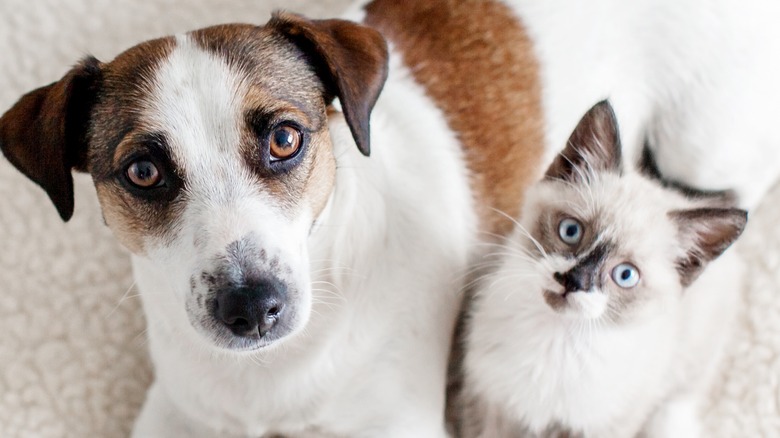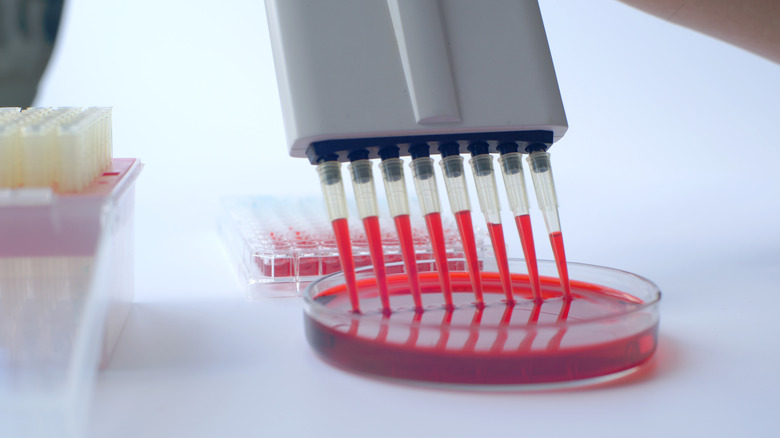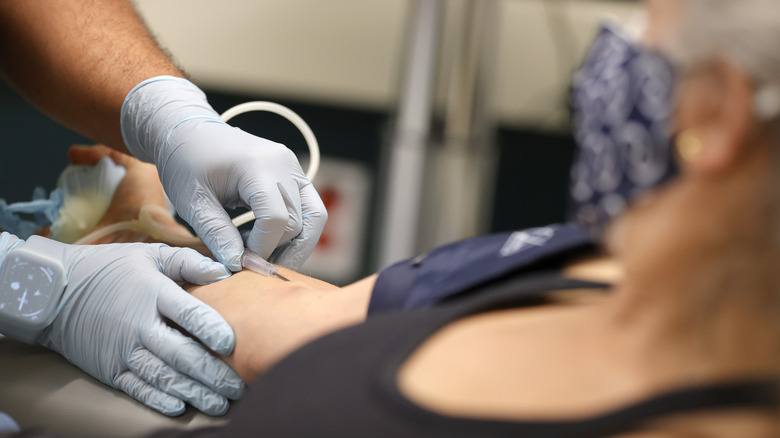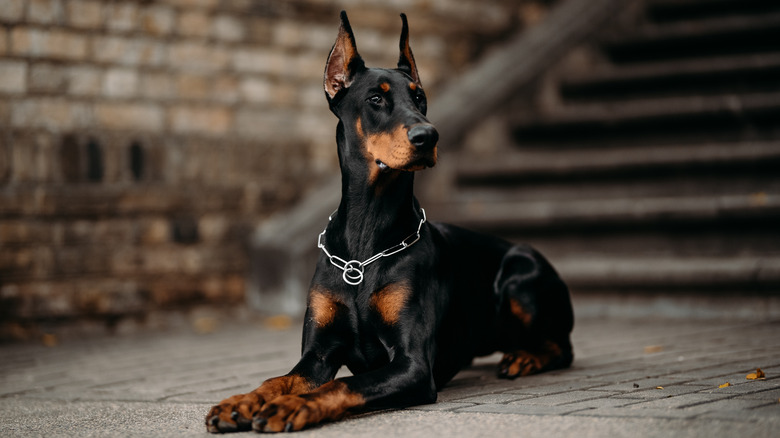Do Dogs And Cats Have Different Blood Types?
Though most of us would probably love for our pets to remain healthy and unharmed throughout their lives, sometimes that isn't possible. Whether because of an accident or an underlying malignancy, dogs and cats sometimes find themselves in need of blood transfusions, as Mental Floss pointed out in a 2012 post. When those transfusions become necessary, vets need to identify what type of blood your furry friend has, so they can find the right blood to transfuse and avoid a potentially dangerous reaction.
Blood types, or blood groups, are determined by the types of protein molecules present in your blood, according to the U.K.'s National Health Service (NHS). The first type of these proteins, antigens, are found on the surface of your red blood cells. These proteins serve to help antibodies identify your blood cells as native particles rather than invaders (via The Conversation). The second type of these key proteins are antibodies, which are found in your blood plasma. Antibodies form the core of your immune system, responding to foreign particles to prevent infections (via Live Science). Antibodies will attack antigens that don't belong in the bloodstream.
Why getting the right blood type is important
These antigens and antibodies can cause a problem if a foreign particle, like someone else's blood, is introduced into the bloodstream, according to The Conversation. If someone has a different blood type than you, their blood cells may have different antigens on them. Your body's antibodies will then recognize these foreign antigens as invaders and attack the transfused blood cells.
Depending on the patient and scenario, this reaction can be deadly. When your body attacks foreign blood cells, the process releases harmful chemicals, according to Forbes. These chemicals can then cause a cascading effect of negative symptoms throughout your body, including causing your kidneys to fail. Untreated, the victim of a bad transfusion will likely die.
However, getting the wrong transfusion isn't always deadly. For one thing, hospitals can treat bad blood transfusions. Moreover, some different blood types are actually compatible, according to the NHS. That means that people can oftentimes receive blood from someone with a slightly different blood type than they have, without any sort of negative affect.
Human blood types
Humans have eight main blood types: O+, O-, A+, A-, B+, B-, AB+, and AB- (via the NHS). Some of these different blood types are compatible, meaning you can receive a transfusion from someone with a different blood type, while others are not. Type A, B, and AB blood are marked by specific antigens, with Type A blood having A antigens, Type B blood having B antigens, and AB blood having both A and B antigens. Type O blood, on the other hand, is distinguished by the lack of antigens on its red blood cells.
Similarly, the positive or negative nature of blood is determined by the presence or lack of an RhD antigen on your blood cells, according to the NHS. If you have a positive blood type, you have an RhD antigen in addition to your other antigens. The key to figuring out compatibility of blood donations is the principle that you can't accept blood from someone whose blood contains different antigens from yours. For instance, a person with B+ blood can't accept A+ blood, because the A antigens would react negatively with the anti-A antibodies in the B+ bloodstream.
Dog and cat blood types
Like humans, dogs and cats have complex systems of blood types. For cats, there are three blood types: A, B, and AB, according to Mental Floss. Around 99% of American cats have Type A blood, according to Merck Veterinary Manual, so while there are no universal cat donors, most cats can donate blood to any other cat.
Dogs' blood typing system is more complex. There are seven different blood types for dogs, according to IndyVet: DEA 1.1, DEA 1.2, DEA 1.3, DEA 4, DEA 4, DEA 5, and DEA 7. Dogs that are DEA 1.1 positive are generally considered universal recipients, meaning they can accept transfusions from all different blood types. On the flip side, dogs that have only the DEA 4 antigen are usually universal donors, meaning they can donate to all different types of dogs.
Blood types tend to run within breeds, so you can usually narrow down the likely blood types for your dog just by knowing their breed. For instance, as many as three-quarters of all Doberman Pinschers have the blood type DEA 4, according to IndyVet.
Blood types of other animals
Other species of animals have their own blood types, too. Horses, like dogs, have seven different blood antigens, labeled A, C, D, K, P, Q, and U, according to University of California Davis. Similarly, pigs have five different types of blood: Ea, Eb, Ga, Ha, and Ka blood. And cows have an even more complex blood typing system. In addition to their 11 major blood groups, cows have a secondary system, like the human RhD system, with over 60 different antigens, according to How Stuff Works. That means if you've got a cow in need of a transfusion, you might be out of luck.
But that doesn't mean cross-species transfusions are impossible. Also called xenotransfusions, these were reportedly carried out successfully as early as 1667, according to an article posted at the National Library of Medicine. That was when Jean-Baptiste Denis gave a boy a transfusion from a lamb without triggering kidney failure or shock, according to Science Focus. The practice has since fallen out of favor as a core source of blood donations, but animal-to-human transplants are still used in other areas of medicine, including in a groundbreaking 2022 surgery which saw a man receive a heart transplant from a pig, according to NPR.
Where vets get blood for dog and cat transfusions
The process for collecting blood donations for pets is relatively similar to the process for humans. In just the same way that there are human blood banks, there are also pet blood banks, according to PetMD. Since the late 1980s, hospitals and veterinary clinics have created their own blood donation systems, according to IndyVet. Many blood banks rely on health donors to build up a supply of blood, such as other patients of the veterinary clinic. Dogs are considered eligible donors if they weigh above 55 pounds and have never been pregnant, according to Mental Floss.
However, other blood banks take a different tack to building up blood supplies, including hosting a so-called "colony" of dogs, whose blood is collected over a period of time for other dogs. Greyhounds, including former racing greyhounds, are often used for these banks, according to the Orange County Register.





